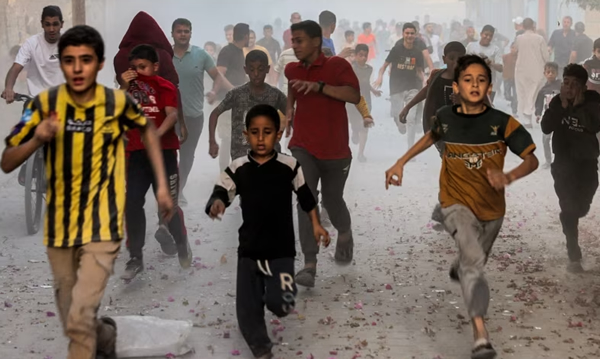
Several United Nations humanitarian officials warned Tuesday that there is a high risk of conflict-induced famine in the Gaza Strip if the war does not stop soon.
“If nothing is done, we fear widespread famine in Gaza is almost inevitable, and the conflict, which since October has claimed the lives of almost 30,000 people and injured more than 70,000, according to the Ministry of Health in Gaza, will have many more victims,” said Ramesh Rajasingham, director of the coordination division in the U.N. humanitarian office.
He addressed a meeting of the U.N. Security Council requested by members Algeria, Guyana, Slovenia and Switzerland, amid rising concerns that hunger is being used as a weapon in the war.
Rajasingham said at least 576,000 people in Gaza — 25% of the population — are one step away from famine, and practically the entire population is relying on insufficient humanitarian food assistance to survive.
“Unfortunately, as grim as the picture we see today, there is every possibility for further deterioration,” he said.
“Gaza is seeing the worst level of child malnutrition anywhere in the world,” said Carl Skau, the World Food Program’s deputy executive director. “One child in every six under the age of 2 is acutely malnourished.”
Agricultural production collapsing
Maurizio Martina, assistant director-general of the U.N.’s Food and Agriculture Organization, explained how the entire food supply chain has been impacted by the war. Farmers have been forced by Israel to evacuate their land or fled shelling that has destroyed crops; cattle and poultry are dying from hunger or killed in bombings; fishing is prohibited; and ground water is contaminated.
“In the most likely scenario, agricultural production will have collapsed in the north by May 2024,” Martina said. “We are already seeing this collapse.”
In a memorandum known as a white note, sent to the council ahead of the session, U.N. humanitarian chief Martin Griffiths reported on the risk of conflict-induced famine in accordance with a 5-year-old council resolution on the subject.
“Immediate action is needed to prevent conflict-induced famine and widespread food insecurity in Gaza,” he wrote. He called for a cease-fire and urged the council to use its influence and to take action to facilitate aid access into and within Gaza, resume the entry of commercial goods into the territory, and protect and restore critical infrastructure, among other recommendations.
Flow of aid ‘unpredictable,’ ‘insufficient’
Griffiths said humanitarians continue to face “significant obstacles” to providing the response required to avert famine.
“These include border crossing closures, serious movement restrictions, access denials, onerous vetting procedures, security risks, incidents by desperate civilians, a breakdown of law and order, and restrictions on communications and protective equipment,” Griffiths wrote. “Logistical infrastructure, both inside and outside Gaza, is inadequate and the flow of aid remains unpredictable and insufficient.”
Israel denies it is hindering or limiting the delivery of aid to Gaza.
“Israel is doing all it can to care for civilians, going above and beyond what is expected, let alone required,” Israel’s deputy U.N. envoy Jonathan Miller told the council. “Israel is committed to improving the humanitarian situation in Gaza, working constantly to ensure the entry of humanitarian aid from numerous countries and U.N. agencies.”
Miller said Israel has facilitated the delivery of 254,000 tons of relief supplies into Gaza since the start of the war, including 165,000 tons of food. He blamed Hamas for diverting aid and the U.N. for failing to efficiently manage and distribute it.
“The limitations on the quantity and pace of aid are dependent on the capacity of the United Nations and other agencies to receive, store and distribute the assistance efficiently,” Miller said.
Famine ‘imminent’ in northern Gaza
The situation is most dire in northern Gaza, which remains cut off by the Israeli military.
About 300,000 people are believed to have defied Israel’s earlier evacuation order and remained through months of heavy fighting between the Israel Defense Forces and Hamas.
“If nothing changes, a famine is imminent in northern Gaza,” WFP’s Skau said. “We must all live up to our responsibilities to ensure it does not happen on our watch.”
The U.N. agency that assists Palestinians, UNRWA, and delivers the bulk of the relief supplies, says the last time it was able to get food aid to northern Gaza was on January 23. On February 20, the World Food Program suspended its deliveries to the north because of a lack of security for both the aid workers and recipients. The World Health Organization last reached Gaza City’s largest hospital, Al Shifa, on January 22 with medical supplies.
One week ago, the 15-nation Security Council failed to adopt a resolution calling for an immediate humanitarian cease-fire because of a veto from the United States. Several council members renewed their call for a cease-fire at Tuesday’s meeting.
“Only a cease-fire, which must be respected by all parties to the conflict, can guarantee the delivery of humanitarian aid without interruption, ensuring adequate, timely assistance,” said Slovenian Ambassador Samuel Žbogar.
Guyana, which chaired the council this month, said of the conflict and rising food insecurity that “silence is not an acceptable response.”
“The Security Council must intervene to stop the blatant violations of international law being committed by a member state of the United Nations,” Ambassador Carolyn Rodrigues-Birkett said.
Even Israel’s closest ally, the United States, indicated its growing frustration with the slow pace of aid deliveries, urging Israel to keep border crossings open and to open new ones.
“Simply put, Israel must do more,” Ambassador Robert Wood said.
Russia, which rarely supports sanctions, suggested the council consider imposing them for the obstruction of humanitarian aid.
Israel began its military campaign to eliminate Hamas after the group’s fighters crossed into southern Israel on October 7 and killed 1,200 people, according to Israeli officials. About 250 others were taken as hostages.
Hamas, designated a terror group by the United States, the United Kingdom, and the European Union, still holds about 130 hostages in Gaza, including 30 who are believed to be dead.
Source: voanews.com























